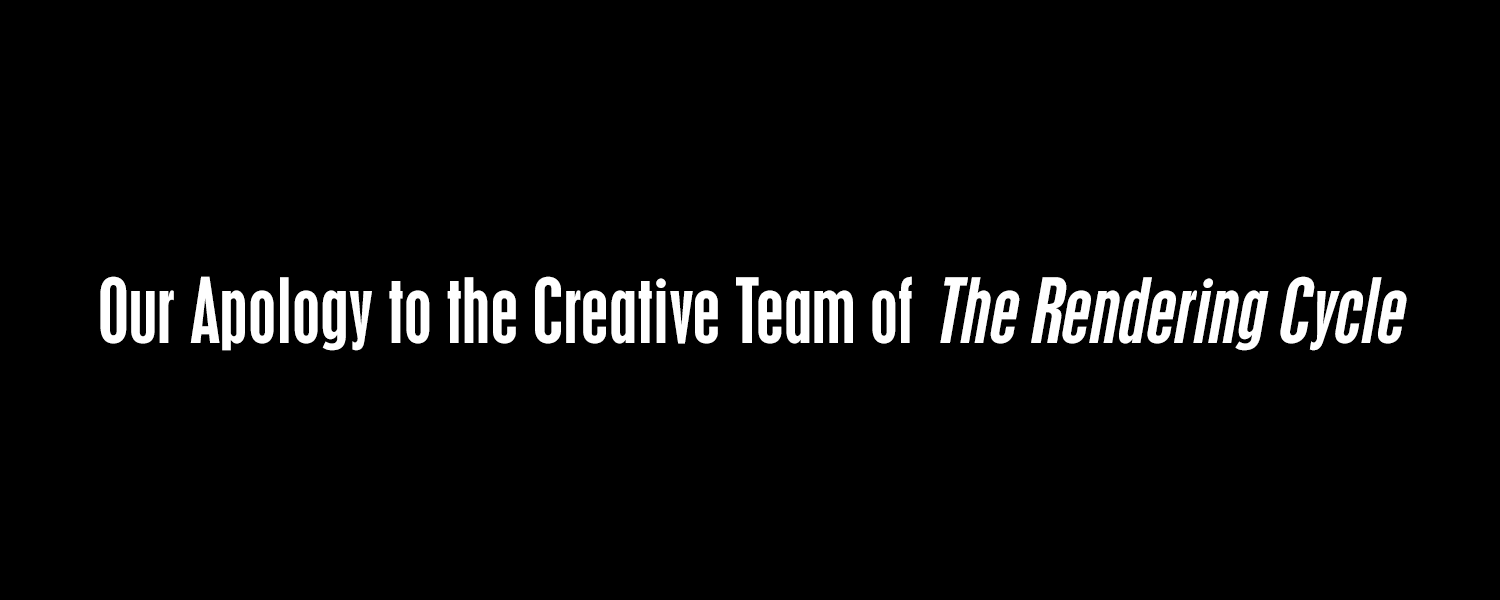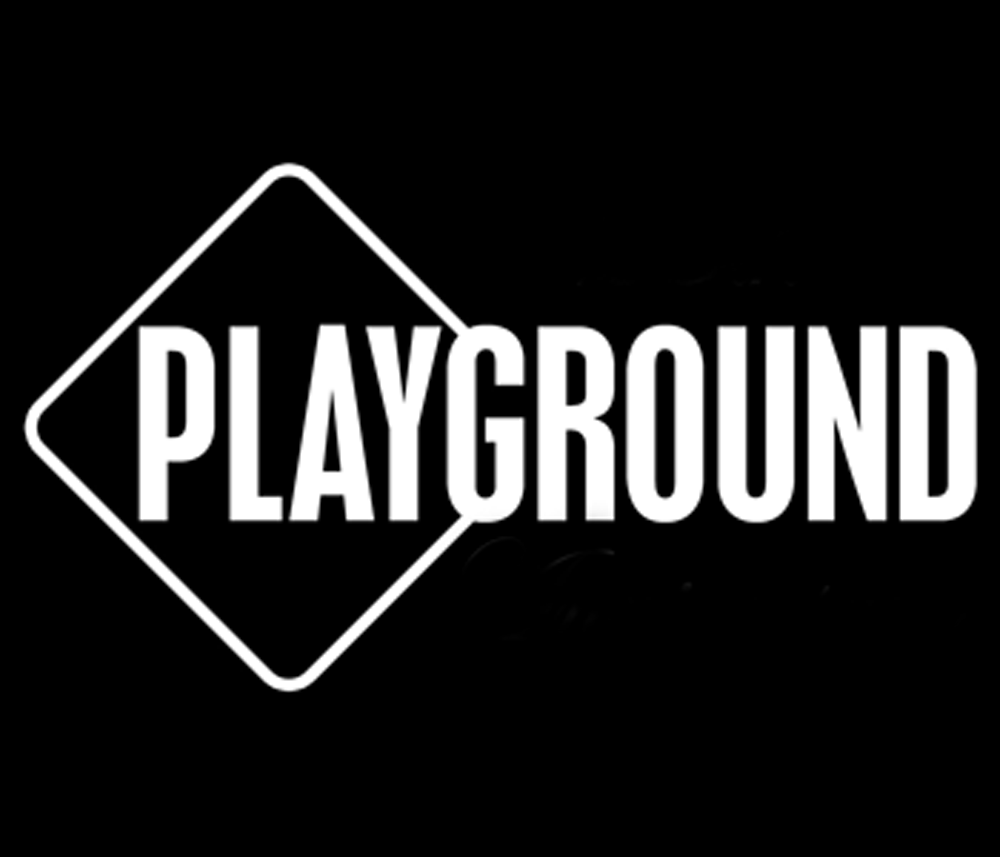Our Apology to the Creative Team of The Rendering Cycle
 We write today to offer our sincerest apologies to the cast and crew of The Rendering Cycle for the ways in which they were under served during the PlayGround Zoom Fest premiere presentation that took place in June. We are making this apology public to take responsibility for our actions and inaction and ensure we are held accountable publicly for future reform. We are also sharing this apology with the PlayGround staff, board, company and writers company, as well as the newly-constituted PlayGround Equity Workgroup, to ensure the full accountability of the organization.
We write today to offer our sincerest apologies to the cast and crew of The Rendering Cycle for the ways in which they were under served during the PlayGround Zoom Fest premiere presentation that took place in June. We are making this apology public to take responsibility for our actions and inaction and ensure we are held accountable publicly for future reform. We are also sharing this apology with the PlayGround staff, board, company and writers company, as well as the newly-constituted PlayGround Equity Workgroup, to ensure the full accountability of the organization.
When the COVID-19 pandemic hit and shelter-in-place orders went into effect, we were in the middle of a developmental workshop of Genevieve Jessee’s new play, The Rendering Cycle, planned for its PlayGround Festival premiere in June 2020. Overnight, director Lauren Spencer and actors Cathleen Riddley, Champagne Hughes, Armando McClain, and Caitlin Evenson had to switch from deep and intense in-person work to a socially-distant online final read-through via Zoom. The workshop ended abruptly on March 17 without clarity on what would/could happen next.
As it became clear that the theater closures and shelter-in-place orders would likely remain beyond our planned festival production, we began approaching each artist in late April to see if they would be open to rehearsing and performing the work online as part of a fully-digital new works festival and 25th anniversary celebration, the PlayGround Zoom Fest, which would run May 11 to June 14 via Zoom live stream. While Genevieve and the cast all ultimately agreed individually and collectively to move forward, Lauren stepped down as director and Margo Hall stepped in. The cast was confirmed on April 28 and the official announcement of the Zoom Fest and The Rendering Cycle premiere presentation was made on May 5. We began rehearsals on May 14 with tech scheduled to start June 2 and a pair of online performances set for June 6 and 7.
To say this was a challenging and quickly-moving process for the cast and crew would be an understatement. We were literally “building the plane as we were flying it”. The festival opened with several zoom staged readings and there was one premiere presentation prior to The Rendering Cycle. Each presented an opportunity for learning and growth. But as we faced challenges of communication, equipment, and personnel, the gaps in our abilities and the level of our overreach became more pronounced.
And then, on May 25, George Floyd was murdered by police and the world turned upside down. A challenging situation became deeply personal and that much more difficult, if not impossible, for the largely Black cast and crew of The Rendering Cycle. The week of June 1, there were public protests, police response, and nightly curfews. Consideration was made as to whether to postpone the production, cancel it outright, or proceed. In conversation with Margo, who had consulted with the cast, the decision was made to go forward, though with earlier tech and performance times to limit times outside of curfew. And the presentations went forward on June 6 and June 7 as scheduled.
From the outside, it appeared that PlayGround and the cast of The Rendering Cycle had successfully pulled it off, rising to the moment and overcoming adversity to share a timely and poignant work of new theatre that marked the traumas and celebrated the joys of the Black experience over 400 years of history, and doing so safely and while socially distant. In reality, as we would discover much later, nothing could be further from the truth. On July 25, PlayGround staff leaders met with a cast member of The Rendering Cycle at their request and learned firsthand of the many ways in which the cast felt under served and harmed by PlayGround’s actions and inactions during the PlayGround Zoom Fest. Subsequent communications with the entire cast confirmed the injuries and expanded our understanding of the depth of the issues. We therefore write today to name those ways in which we have, through action or inaction, caused harm and share our commitment to repairing that harm if possible and eliminating such future harms for all casts and crews who may follow.
- We failed in our communications and transparency with the cast and crew, to provide them with the information they needed to determine how/whether to progress with their work;
- We failed to recognize or attempt to address the continuing trauma for the cast on losing their original director, with whom they had set a path for the development of this play through the initial workshop;
- We failed to consult with the cast and crew, to identify what support they might need, what struggles they were facing, and what changes in our process or offering might be necessary, as a result of the shift online, the change of director, the murder of George Floyd and resulting civil protests;
- We failed to adequately support director Margo Hall, undermining her ability as a director and leader of the production team, and challenging her proposal to scale back the technical aspects of the show in response to the extreme duress of the cast;
- We failed to identify, secure and provide for the cast and crew in a timely manner the equipment and support personnel they needed to do their work (computers, microphones, green screens, production assistants);
- We failed to provide those resources where the artists lived, leading to increased emotional and physical risks by having them travel to where the resources were available;
- We failed to center Black voices and Black artists at a time when a national movement (LivingDoc, WeSeeYouWAT) demanded better;
- We failed to allocate resources for the cast and crew’s emotional labor in support of this project;
- We failed to consult with the cast and crew on plans for post-performance discussions, which could have provided a much-needed opportunity for conversation and centering of The Rendering Cycle’s Black artists; instead, we omitted one featured artist from the list of invitees and, in another case, we centered a non-BIPOC civil rights attorney and a Black male host for a play that featured and celebrated Black women’s journeys;
- We failed to seize the moment and provide additional performance and compensation opportunities for the performers, instead letting the run end on June 7 as originally scheduled;
- We exacerbated this failure by collaborating on and facilitating the June 19 regional and national launch of the Juneteenth Theatre Justice Project so quickly after The Rendering Cycle’s close;
- We failed to ask the cast and crew what they might need after the close of their work to process the experience, the challenges of the Zoom Fest and the current moment, and any resources we could provide to assist them in healing and moving forward;
- Ultimately, we failed to provide a supportive and safe environment where artists could facilitate the development and presentation of this important play by a significant new voice and share their artistry.
For all of these ways in which we failed the cast and crew of The Rendering Cycle, we acknowledge the harm they have experienced, offer our deepest apologies, and commit to doing better by them and all artists who may follow. We are also forwarding this apology to the recently-launched PlayGround Equity Workgroup, whose purpose is to help us address issues of historic and longstanding inequities, to respond to the demands of the Living Document BIPOC Equity Action Plan and #WeSeeYouWAT, and to make recommendations on policies and strategies that will eliminate future harms and create a more just and equitable theatre for all. We will report back on our progress over the next year.
